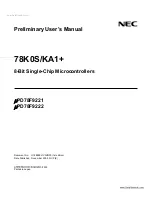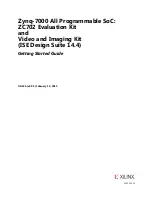
MOTOROLA
Chapter 4. The PowerPC Core
4-17
Part II. PowerPC Microprocessor Module
Table 4-5 summarizes MPC860 features with respect to the OEA deÞnition.
Memory
control
instructions
The MPC860 interprets cache control instructions as if they pertain only to the MPC860 cache.
These instructions do not broadcast. Any bus activity caused by these instructions results from an
operation performed on the MPC860 cache and not because of the instruction itself.
¥ Instruction Cache Block Invalidate (
icbi
)ÑThe MMU translates the EA and the associated
instruction cache block is invalidated if hit.
¥ Instruction Synchronize (
isync
)ÑThe
isync
instruction waits for all previous instructions to
complete and then discards any prefetched instructions, causing subsequent instructions to be
fetched or refetched from memory and executed.
¥ Data Cache Block Touch (
dcbt
) and Data Cache Block Touch for Store (
dcbtst
)ÑThe appropriate
cache block is checked for a hit. If it is a miss, the instruction is treated as a regular miss, except
that bus error does not cause an exception. If no error occurs, the cache is updated.
¥ Data Cache Block Set to Zero (
dcbz
)ÑExecutes as deÞned in the VEA.
¥ Data Cache Block Store (
dcbst
)ÑExecutes as deÞned in the VEA.
¥ Data Cache Block Invalidate (
dcbi
)ÑThe MMU translates the EA and the associative data cache
block is invalidated if hit.
¥ Data Cache Block Flush (
dcbf
)ÑExecutes as deÞned in the VEA.
¥ Enforce In-Order Execution of I/O (
eieio
)ÑWhen executing an
eieio
instruction, the LSU waits for
previous accesses to terminate before beginning accesses associated with load/store instructions
after the
eieio
instruction.
Time base
The time base functions as deÞned by the VEA and supports an additional implementation-speciÞc
exception. The time base is described in Chapter 11, ÒSystem Interface Unit
,Ó
Table 4-5. OEA-Level Features
Functionality
Description
Machine state
register
The ßoating-point exception mode (bits FE0 and FE1) is ignored by the MPC860. The IP bit initial
state after reset is set as programmed by the reset conÞguration speciÞed in Section 7.1.2.1,
ÒSystem Reset Interrupt (0x00100).Ó
Processor
version register
The value of the PVR registerÕs version Þeld is 0x0050. The value of the revision Þeld is 0x0000 and
it is incremented each time the software distinguishes between the revisions.
Other OEA
registers
The following registers are not implemented: SDR1, BAT registers, segment registers, and EAR
Page size
The MPC860 differs from the OEA-deÞned memory management mode with respect to page sizes.
Page sizes are 4, 16, and 512 Kbytes, and 8 Mbytes with an optional subpage granularity of 1 Kbyte
for 4-Kbyte pages in a maximum physical memory size of 4 Gbytes. Neither ordinary or direct-store
segments are supported.
Address space
The MPC860 differs from the OEA-deÞned memory management model. SpeciÞcally, it does not
support the same address translation mechanism that requires an intermediate 52-bit virtual
address. It also does not support block address translation or the associated block address
translation SPRs. In its place, the MPC860Õs internal memory space includes memory-mapped
control registers and memory used by various modules on the chip. This memory is part of the main
memory as seen by the core but cannot be accessed by any external system device.
Table 4-4. VEA-Level Features (Continued)
Functionality
Description
Summary of Contents for MPC860 PowerQUICC
Page 3: ...MPC860UM AD 07 98 REV 1 MPC860 PowerQUICC ª UserÕs Manual ...
Page 36: ...xxxvi MPC860 PowerQUICC UserÕs Manual MOTOROLA CONTENTS Paragraph Number Title Page Number ...
Page 78: ...I iv MPC860 PowerQUICC UserÕs Manual MOTOROLA Part I Overview ...
Page 88: ...1 10 MPC860 PowerQUICC UserÕs Manual MOTOROLA Part I Overview ...
Page 114: ...3 16 MPC860 PowerQUICC UserÕs Manual MOTOROLA Part I Overview ...
Page 226: ...8 32 MPC860 PowerQUICC UserÕs Manual MOTOROLA Part II PowerPC Microprocessor Module ...
Page 262: ...9 36 MPC860 PowerQUICC UserÕs Manual MOTOROLA Part II PowerPC Microprocessor Module ...
Page 274: ...III iv MPC860 PowerQUICC UserÕs Manual MOTOROLA Part III Configuration ...
Page 320: ...12 12 MPC860 PowerQUICC UserÕs Manual MOTOROLA Part III Configuration ...
Page 325: ...MOTOROLA Part IV Hardware Interface IV v Part IV Hardware Interface ...
Page 326: ...IV vi MPC860 PowerQUICC UserÕs Manual MOTOROLA Part IV Hardware Interface ...
Page 352: ...13 26 MPC860 PowerQUICC UserÕs Manual MOTOROLA Part IV Hardware Interface ...
Page 394: ...14 42 MPC860 PowerQUICC UserÕs Manual MOTOROLA Part IV Hardware Interface ...
Page 426: ...15 32 MPC860 PowerQUICC UserÕs Manual MOTOROLA Part IV Hardware Interface ...
Page 530: ...17 26 MPC860 PowerQUICC UserÕs Manual MOTOROLA Part IV Hardware Interface ...
Page 632: ...21 44 MPC860 PowerQUICC UserÕs Manual MOTOROLA Part V The Communications Processor Module ...
Page 660: ...22 28 MPC860 PowerQUICC UserÕs Manual MOTOROLA Part V The Communications Processor Module ...
Page 708: ...24 24 MPC860 PowerQUICC UserÕs Manual MOTOROLA Part V The Communications Processor Module ...
Page 748: ...27 20 MPC860 PowerQUICC UserÕs Manual MOTOROLA Part V The Communications Processor Module ...
Page 846: ...31 20 MPC860 PowerQUICC UserÕs Manual MOTOROLA Part V The Communications Processor Module ...
Page 914: ...35 12 MPC860 PowerQUICC UserÕs Manual MOTOROLA Part V The Communications Processor Module ...
Page 948: ...36 34 MPC860 PowerQUICC UserÕs Manual MOTOROLA Part V The Communications Processor Module ...
Page 998: ...37 48 MPC860 PowerQUICC UserÕs Manual MOTOROLA Part VI Debug and Test ...
Page 1016: ...A 10 MPC860 PowerQUICC UserÕs Manual MOTOROLA Appendixes ...
Page 1024: ...B 8 MPC860 PowerQUICC UserÕs Manual MOTOROLA Appendixes ...
Page 1030: ...C 6 MPC860 PowerQUICC UserÕs Manual MOTOROLA Appendixes ...
Page 1086: ...Glossary 12 MPC860 PowerQUICC UserÕs Manual MOTOROLA ...
Page 1106: ......
















































